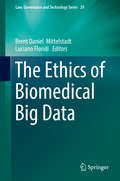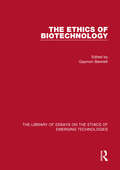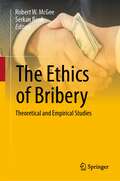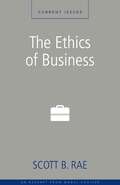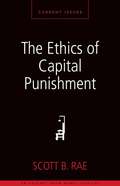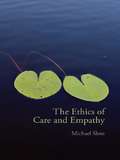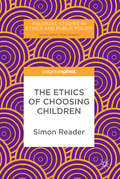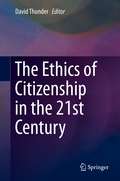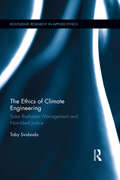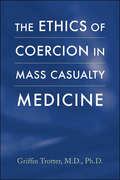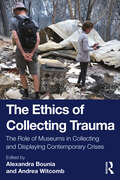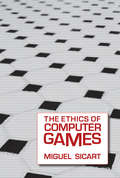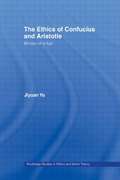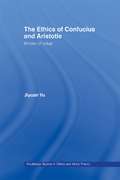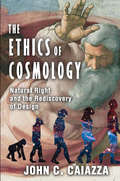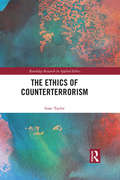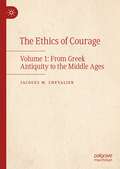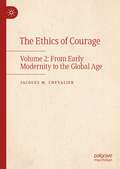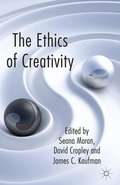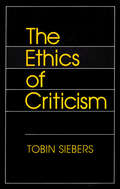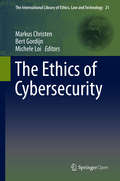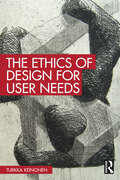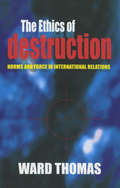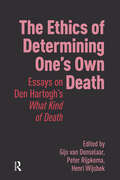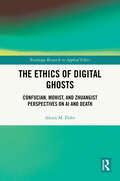- Table View
- List View
The Ethics of Biomedical Big Data
by Luciano Floridi Brent Daniel MittelstadtThis book presents cutting edge research on the new ethical challenges posed by biomedical Big Data technologies and practices. 'Biomedical Big Data' refers to the analysis of aggregated, very large datasets to improve medical knowledge and clinical care. The book describes the ethical problems posed by aggregation of biomedical datasets and re-use/re-purposing of data, in areas such as privacy, consent, professionalism, power relationships, and ethical governance of Big Data platforms. Approaches and methods are discussed that can be used to address these problems to achieve the appropriate balance between the social goods of biomedical Big Data research and the safety and privacy of individuals. Seventeen original contributions analyse the ethical, social and related policy implications of the analysis and curation of biomedical Big Data, written by leading experts in the areas of biomedical research, medical and technology ethics, privacy, governance and data protection. The book advances our understanding of the ethical conundrums posed by biomedical Big Data, and shows how practitioners and policy-makers can address these issues going forward.
The Ethics of Biotechnology
by Gaymon Bennett, Fred HutchinsonThe essays collected in this volume provide students of ethics with essential tools for making sense of emerging biotechnical capacities and the turbulent power relations these capacities are bringing into the world. Unlike previous reference works in bioethics, which focus on specific domains of human activity (such as genetic research or biomedicine), this volume directs students’ attention to the underlying cultural and institutional forces that shape how biotechnologists approach the world, and teaches students how to weigh the ethical significance of these forces. This innovative approach to the ethics of biotechnology, detailed in the volume’s introduction, equips students to track the dynamic interplay of biology, digital technology and the high-tech economy which is remaking the living world today and the human relation to it.
The Ethics of Bribery: Theoretical and Empirical Studies
by Robert W. McGee Serkan BenkWhile most people assume that all bribery is unethical, the literature provides examples and philosophical arguments to support the proposition that some bribery may actually be ethical, based on utilitarian grounds. This book provides a theoretical and empirical examination of bribery from an ethical perspective. It examines empirical data from over 80 countries and reports on attitudes toward bribery examining demographic variables such as gender, age, ethnicity, education, income level, religion and social class. Multi-country comparisons are provided to determine whether views toward bribery differ by geographic location.
The Ethics of Business: A Zondervan Digital Short
by Scott RaeDerived from Scott B. Rae’s widely adopted textbook, Moral Choices, this digital short looks carefully at economic life in the Bible and at a range of economic and business issues including wealth, materialism, work, calling, capitalism, human resources management, product safety, and more. Rae covers moral and theological principles for a biblically ordered economic life, and also includes cases and questions for further discussion. The Ethics of Business thus provides a wise and well-grounded introduction to an everyday ethical question for Christians, namely, “How can I best serve God in my work and finances?”
The Ethics of Capital Punishment: A Zondervan Digital Short
by Scott RaeDerived from Scott B. Rae’s widely adopted textbook, Moral Choices, this digital short looks carefully at the Bible’s teaching on capital punishment and at arguments for and against it. With cases and questions for further discussion at the end, The Ethics of Capital Punishment provides a wise and well-grounded introduction to a key public policy-related ethical question, namely, “Can a Christian in good conscience support capital punishment today?”
The Ethics of Care and Empathy
by Michael SloteEminent moral philosopher Michael Slote argues that care ethics presents an important challenge to other ethical traditions and that a philosophically developed care ethics should, and can, offer its own comprehensive view of the whole of morality. Taking inspiration from British moral sentimentalism and drawing on recent psychological literature on empathy, he shows that the use of that notion allows care ethics to develop its own sentimentalist account of respect, autonomy, social justice, and deontology. Furthermore, he argues that care ethics gives a more persuasive account of these topics than theories offered by contemporary Kantian liberalism. The most philosophically rich and challenging exploration of the theory and practice of care to date, The Ethics of Care and Empathy also shows the manifold connections that can be drawn between philosophical issues and leading ideas in the fields of psychology, education, and women's studies.
The Ethics of Choosing Children
by Simon ReaderThis book takes the contentious issue of designer babies and argues against the liberal eugenic current of bioethics that commends the logic and choice regimes of selective reproduction. Against conceptions of Procreative Beneficence that trade on a disregard for the gifts of maternal bodies, it seeks to recover a thought of maternal giving and a more hospitable ethic of generational beneficence. Exploring themes of responsibility, gift and natality, the book refigures the experience of reproduction as the site of an ethical response to future generations, where refusal to choose one's children is one virtuous response. The book will appeal to anyone with an interest in reproductive ethics, feminist thought and those seeking principled grounds for resisting the technologies of choosing children.
The Ethics of Citizenship in the 21st Century
by David ThunderThis collection of essays offers thoughtful discussions of major challenges confronting the theory and practice of citizenship in a globalized, socially fragmented, and multicultural world. The traditional concept of citizenship as a shared ethnic, religious, and/or cultural identity has limited relevance in a multicultural world, and even the connection between citizenship and national belonging has been put in jeopardy by increasing levels of international migration and mobility, not to mention the pervasive influence of a global economy and mass media, whose symbols and values cut across national boundaries. Issues addressed include the ethical and practical value of patriotism in a globalized world, the standing of conscience claims in a morally diverse society, the problem of citizen complicity in national and global injustice, and the prospects for a principled acceptance by practising Muslims of a liberal constitutional order. In spite of the impressive diversity of philosophical traditions represented in this collection, including liberalism, pragmatism, Confucianism, Platonism, Thomism, and Islam, all of the volume’s contributors would agree that the crisis of modern citizenship is a crisis of the ethical values that give shape, form, and meaning to modern social life. This is one of the few edited volumes of its kind to combine penetrating ethical discussion with an impressive breadth of philosophical traditions and approaches.Chapters “What is the use of an Ethical Theory of Citizenship?” and “An Ethical Defense of Citizenship” are available open access under a Creative Commons Attribution 4.0 International License via link.springer.com.
The Ethics of Climate Engineering: Solar Radiation Management and Non-Ideal Justice (Routledge Research in Applied Ethics)
by Toby SvobodaThis book analyzes major ethical issues surrounding the use of climate engineering, particularly solar radiation management (SRM) techniques, which have the potential to reduce some risks of anthropogenic climate change but also carry their own risks of harm and injustice. The book argues that we should approach the ethics of climate engineering via "non-ideal theory," which investigates what justice requires given the fact that many parties have failed to comply with their duty to mitigate greenhouse gas emissions. Specifically, it argues that climate justice should be approached comparatively, evaluating the relative justice or injustice of feasible policies under conditions that are likely to hold within relevant timeframes. Likely near-future conditions include "pessimistic scenarios," in which no available option avoids serious ethical problems. The book contends that certain uses of SRM can be ethically defensible in some pessimistic scenarios. This is the first book devoted to the many ethical issues surrounding climate engineering.
The Ethics of Coercion in Mass Casualty Medicine
by Griffin TrotterDisasters, both natural and manufactured, provide ample opportunities for official coercion. Authorities may enact quarantines, force evacuations, and commandeer people and supplies—all in the name of the public's health. When might such extreme actions be justified, and how does a democratic society ensure that public officials exercise care and forethought to avoid running roughshod over human rights?In The Ethics of Coercion in Mass Casualty Medicine, Griffin Trotter explores these fundamental questions with skepticism, debunking myths in pursuit of an elusive ethical balance between individual liberties and public security. Through real-life and hypothetical case studies, Trotter discusses when forced compliance is justified and when it is not, how legitimate force should be exercised and implemented, and what societies can do to protect themselves against excessive coercion. The guidelines that emerge are both practical and practicable. Drawing on core concepts from bioethics, political philosophy, public health, sociology, and medicine, this timely book lays the groundwork for a new vision of official disaster response based on preventing and minimizing the need for coercive action.
The Ethics of Collecting Trauma: The Role of Museums in Collecting and Displaying Contemporary Crises
by Alexandra BouniaThe Ethics of Collecting Trauma offers an interdisciplinary dialogue on the ethics of contemporary museums that are involved in collecting moments of collective trauma.Including a range of international contributions, the volume explores the ethics of collecting material that documents contemporary traumatic events. The case studies focus on four categories of such events: forced migration; terrorism attacks; major natural disasters; and cultural traumas, such as the ongoing legacy of colonization. Contributors consider whether cultural institutions have a right to collect materials about these events and what kind of materials they should focus on, if so; who is being memorialized, who should hold the power to decide what is collected, and what the critical timeline for such initiatives is. The volume also considers what the larger purpose of such collecting is and how to deal with past collecting practices, arguing that museums need to consider, in a careful and deliberate way, their ethical responsibilities as cultural institutions.The Ethics of Collecting Trauma will be of interest to academics and students working in the areas of museum and heritage studies, cultural studies, trauma studies, memory studies, and migration studies. The book will also appeal to museum professionals working around the globe.
The Ethics of Computer Games
by Miguel SicartWhy computer games can be ethical, how players use their ethical values in gameplay, and the implications for game design. Despite the emergence of computer games as a dominant cultural industry (and the accompanying emergence of computer games as the subject of scholarly research), we know little or nothing about the ethics of computer games. Considerations of the morality of computer games seldom go beyond intermittent portrayals of them in the mass media as training devices for teenage serial killers. In this first scholarly exploration of the subject, Miguel Sicart addresses broader issues about the ethics of games, the ethics of playing the games, and the ethical responsibilities of game designers. He argues that computer games are ethical objects, that computer game players are ethical agents, and that the ethics of computer games should be seen as a complex network of responsibilities and moral duties. Players should not be considered passive amoral creatures; they reflect, relate, and create with ethical minds. The games they play are ethical systems, with rules that create gameworlds with values at play. Drawing on concepts from philosophy and game studies, Sicart proposes a framework for analyzing the ethics of computer games as both designed objects and player experiences. After presenting his core theoretical arguments and offering a general theory for understanding computer game ethics, Sicart offers case studies examining single-player games (using Bioshock as an example), multiplayer games (illustrated by Defcon), and online gameworlds (illustrated by World of Warcraft) from an ethical perspective. He explores issues raised by unethical content in computer games and its possible effect on players and offers a synthesis of design theory and ethics that could be used as both analytical tool and inspiration in the creation of ethical gameplay.
The Ethics of Confucius And Aristotle: Mirrors of Virtue
by Jiyuan YuFurthermore, this work focuses on singling out the most significant issues which not only are commonly exploited in these two ethics, but are also of great interest in contemporary virtue ethics. I first became interested in this subject in 1996 when Nicholas Bunnin invited me to speak at a conference on Chinese philosophy that he organized at Oxford University. By that time, Aristotle’s Nicomachean Ethics had been intensively studied as the most important model of virtue ethics for decades. As a student of Aristotle, when I turned my eyes to Chinese philosophy, the first thing I noticed is how similar the Confucian approach to ethics is to Aristotle’s in many aspects. Hence I chose to present a paper dealing with how Aristotle and Confucius conceive the conception of virtue. The paper was later published in the Philosophy East and West 48 (1998), with the title of ‘‘Virtue: Aristotle and Confucius.’’ It became the seed of this book.
The Ethics of Confucius and Aristotle: Mirrors of Virtue (Routledge Studies in Ethics and Moral Theory #7)
by Jiyuan YuAs a comparative study of the virtue ethics of Aristotle and Confucius, this book explores how they each reflect upon human good and virtue out of their respective cultural assumptions, conceptual frameworks, and philosophical perspectives. It does not simply take one side as a framework to understand the other; rather, it takes them as mirrors for each other and seeks to develop new readings and perspectives of both ethics that would be unattainable if each were studied on its own.
The Ethics of Cosmology: Natural Right and the Rediscovery of Design
by John C. CaiazzaWithin the last one hundred years, the scientific conception of the universe has undergone radical change. As a result a new field has evolved, called "cosmology," that examines the philosophical and scientific nature of the universe. Cosmology conceives of a material universe in which the interior of atoms do not act in the same predictable manner as the objects we can see and in which space is no longer empty volume unaffected by the matter within it. The universe is not a machine that operates with the same set of rules, but rather a living, growing organism.This new cosmology is forcing a consideration of the meaning of life that also calls for a reconsideration of moral law—the doctrine of natural right. Natural law theory is based on a cosmology that is grounded in classical metaphysics. John C. Caiazza uses the term "natural right" rather than "natural law" since his argument for cosmic teleology is based on the cosmology of contemporary science and not that of classical metaphysics. If evolution and development are the key to understanding nature, it is important to get the evolutionary concept of nature right, especially when it involves ethics.The universe can be viewed in two ways. One can admire the intricacy of the cosmological process on the physical, chemical, and astronomical levels. Or, one can look at this process as a result of design or providence. These two options should not preclude each other, Caiazza asserts; we should instead look closely at what science reveals about design. This volume offers an opportunity to reconcile the thinking of those who hold to traditional religious views on the origins of the universe and those who look to scientific explanations.
The Ethics of Counterterrorism (Routledge Research in Applied Ethics)
by Isaac TaylorStates across the globe spend billions of dollars fighting terrorism annually. As well as strategic questions about the way in which the money should be spent, we are also confronted with a host of moral issues here, many of which are poorly understood. The Ethics of Counterterrorism offers the first systematic normative theory for guiding, assessing, and criticising counterterrorist policy. Many commentators claim that state actors combating terrorism should set aside ordinary moral and legal frameworks, and instead bind themselves by a different (and, generally, more permissive) set of ethical rules than is appropriate in other areas. The book assesses arguments for this view, and more specifically investigates whether widely-endorsed restrictions on state action in the areas of surveillance, policing, armed conflict, criminal justice, diplomacy, and cultural integration need to be weakened when we are confronted with terrorist threats. With its novel overall framework for assessing counterterrorist strategies, its comprehensive analysis of existing practices, and its bringing the tools of analytic philosophy to bear on new questions regarding how states can fight terrorism both effectively and morally, The Ethics of Counterterrorism promises to be an important point of reference for future debates in this area.
The Ethics of Courage: Volume 1: From Greek Antiquity to the Middle Ages
by Jacques M. ChevalierThis two-volume work examines far-reaching debates on the concept of courage from Greek antiquity to the Christian and mediaeval periods, as well as the modern era. Volume 1 begins with Homeric poetry and the politics of fearless demi-gods thriving on war. The tales of lion-hearted Heracles, Achilles, and Ulysses, and their tragic fall at the hands of fate, eventually give way to classical views of courage based on competing theories of rational wisdom and truth. Fears of the enemy and anxieties about suffering and death are addressed through the lenses and teachings of medicine, geography, military history, moral philosophy, and metaphysics. For early Christian thinkers, the ethics of fear, fate, and fealty to the Almighty supplant the voice of reason and the wisdom of virtue. Much of Christian doctrine's history is a long journey towards bridging the gap between Greek philosophy and devotion to God and spirits in heaven. Some Church Fathers attempt to dispel the fear of suffering through a joyful craving for martyrdom and the eternal blessings that follow. Others show openness to one or more of the following principles: the abstractions of moral philosophy, the metaphysics of Gnostic enlightenment, the gift of free will and intentionality, the growth of church authority and hegemony, and the intrinsic worth of life on Earth. Augustine, Ambrose, Cassian, and Chrysostom play a central role in revisiting the foundations of Christian fortitude along some or all of these lines. They lay the groundwork for the scholastic adaptations of faith-based rationalism proposed by Peter Lombard, Philip the Chancellor, Albert the Great, and Thomas of Aquinas. The mediaeval period ends with church dissidents and Protestant Reform leaders condemning Rome’s corruption and calling for a return to early Christian faith and the courage of godly fear, submission, suffering, and fate.
The Ethics of Courage: Volume 2: From Early Modernity to the Global Age
by Jacques M. ChevalierThis two-volume work examines far-reaching debates on the concept of courage from Greek antiquity to the Christian and mediaeval periods, as well as the modern era. Volume 1 explains how competing accounts of epistêmê, rational wisdom, and truth dominated classical antiquity. Early Christian and mediaeval thinkers, in contrast, favoured fortitude founded on faith and fear of God over philosophical reasoning left to its own devices. Volume 2 turns to theories of courage from the early modern period to the present. It shows how the twin laws of polis and physis are at the heart of post-medieval thought. Courage is found at the crossroads of love and dread, freedom and fate, happiness and suffering, as well as power and submission to the ruling order. The later influence of evolutionism, existentialism, and the social and natural sciences on moral philosophy is also addressed at some length. The protection of people's best interests, the passions and powers of the human will, and the rule of active energy in all aspects of life supplant courage formerly viewed through the lens of reason or faith, or a combination of the two. These new ideas, paradoxically, herald the end of the ethics of courage. They also undermine the courage of ethical thinking. Courage is no longer an end in itself, nor is it a means to happiness "at the end." Regardless of what Gandhi, Tillich, and Foucault have to say about the topic, late modernity and the global age witness a marked loss of interest in courage as an idea worthy of conceptual investigation. Debates about the moral implications of courage give way to the value-free science of resilience, which studies how people can recover from past trauma and find wellness, primarily in the realm of physis.
The Ethics of Creativity
by James C. Kaufman Seana Moran David CropleyThe Ethics of Creativity illuminates the thorny issues that arise when novel creative ideas collide with what we believe to be 'right' or 'good'. This book tackles questions of when creativity and ethics tend to coincide and when conflict, and how both might be harnessed to support a brighter future for all.
The Ethics of Criticism
by Tobin SiebersTobin Siebers asserts that literary criticism is essentially a form of ethics. The Ethics of Criticism investigates the moral character of contemporary literary theory, assessing a wide range of theoretical approaches in terms of both the ethical presuppositions underlying the critical claims and the attitudes fostered by the approaches. Building on analyses of the moral legacies of Plato, Kant, Nietzsche, and Freud, Siebers identifies the various fronts on which the concerns of critical theory impinge on those of ethics.
The Ethics of Cybersecurity (The International Library of Ethics, Law and Technology #21)
by Markus Christen Bert Gordijn Michele LoiThis open access book provides the first comprehensive collection of papers that provide an integrative view on cybersecurity. It discusses theories, problems and solutions on the relevant ethical issues involved. This work is sorely needed in a world where cybersecurity has become indispensable to protect trust and confidence in the digital infrastructure whilst respecting fundamental values like equality, fairness, freedom, or privacy. The book has a strong practical focus as it includes case studies outlining ethical issues in cybersecurity and presenting guidelines and other measures to tackle those issues. It is thus not only relevant for academics but also for practitioners in cybersecurity such as providers of security software, governmental CERTs or Chief Security Officers in companies.
The Ethics of Design for User Needs
by Turkka KeinonenThis book offers an inquiry into the ethics of ‘human needs capture’ for design purposes by drawing upon ethical theories and narratives. Designers have historically relied upon the satisfaction of human needs as a moral justification for their profession. This volume offers an alternative critique to challenge this perspective, arguing that seeking to satisfy needs doesn't offer sufficient moral justification on its own. It presents an extensive ethical analysis of the notion of need and develops a thought-provoking case for a plural reconceptualisation of the notion of ‘need’ as user-based knowledge about product and service improvement opportunities. It does this by drawing upon a range of ethical approaches including Soran Reader’s needs ethics, classical utilitarianism, Robert Nozick’s libertarian philosophy, and John Rawls’ theory of justice. The book goes on to link these approaches to concepts guiding design such as human-centred design, collaborative design, and end user innovation. Written as a dialogue between a designer and his consciousness, the book underlines the deliberative nature of applied design ethics, and also highlights how consciousness challenges designers to solve their moral dilemmas. This engaging format invites readers to become an intimate part of the ‘discussion’. This book will be of interest to students and academics studying product design, industrial design, interaction design, user experience design, design ethics, and sustainable development.
The Ethics of Destruction: Norms and Force in International Relations
by Ward ThomasMany assume that in international politics, and especially in war, "anything goes." Sherman famously declared war "is all hell." The implication behind the maxim is that in war there is no order, only chaos; no mercy, only cruelty; no restraint, only suffering.Ward Thomas finds that this "anything goes" view is demonstrably wrong. It neither reflects how most people talk about the use of force in international relations nor describes the way national leaders actually use military force. Events such as those in Europe during World War II, in the Persian Gulf War, and in Kosovo cannot be understood, he argues, until we realize that state behavior, even during wartime, is shaped by common understandings about what is ethically acceptable and unacceptable.Thomas makes extensive use of two cases--the assassination of foreign leaders and the aerial bombardment of civilians--to trace the relative influence of norms and interests. His insistence on interconnections between ethical principle and material power leads to a revised understanding of the role of normative factors in foreign policy and the ways in which power and interest shape the international system.
The Ethics of Determining One’s Own Death: Essays on Den Hartogh’s What Kind of Death
by Gijs Van Donselaar Peter Rijpkema Henri WijsbekThis collection brings together key contributions on the ethics of end-of-life decisions, inspired by the publication of What Kind of Death: The Ethics of Determining One’s Own Death, a new standard work by professor Govert den Hartogh. The topics covered reflect the book's comprehensive approach, with its central themes explored by ethicists, legal experts, and medical professionals. The various contributions offer a thorough examination of the major steps in Den Hartogh’s 'dual track approach'. This collection serves as a valuable supplement to the book and an important contribution to the ongoing debate about patient self-determination and well-being as foundational values in the ethics of determining one’s own death.
The Ethics of Digital Ghosts: Confucian, Mohist, and Zhuangist Perspectives on AI and Death (Routledge Research in Applied Ethics)
by Alexis M. ElderAdvances in artificial intelligence (AI) are enabling the construction of “digital ghosts”: algorithmic reconstructions of deceased individuals based on patterns of interaction in their text messages, social media posts, and other personal data. This book develops an ethics of digital ghosts using resources from classical Chinese philosophy.Bereaved people have reported that conversations with digital ghosts can be surprisingly comforting and beneficial. However, there are concerns that they can be harmful, whether by preventing a hard but necessary acknowledgment of loss, producing ongoing dependence, or encouraging instrumentalization of our beloved dead. Building on some suggestive comparisons between digital remains and physical remains, this book uses resources from classical Chinese philosophy to connect concerns from funerary ethics to those presented by AI today. Confucianism, Mohism, and Zhuangism were remarkable for their rich, detailed discussions of the ethics of handling physical remains. This book updates and extends these concerns to apply to digital ghosts. It explores topics including the role of rituals and traditions in communal mourning, the epistemic consequences of fragmented standards for remembrance and data reuse, and the value of creative transformation and adaptation. The result is a psychologically plausible, culturally informed, and afterlife-neutral grounding for thinking about the ethics of digital ghosts.The Ethics of Digital Ghosts will appeal to researchers and graduate students working in applied ethics, moral psychology, philosophy of technology, technology and AI ethics, cross-cultural philosophy, and classical Chinese philosophy.
